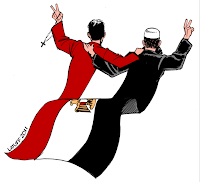"Freedom is a blessing that deserves fighting for it." - Wael Ghonim, Google's head of Marketing for the Middle East and North Africa and the founder of the Facebook page that was said to have been influential in fomenting the protests, who had been in custody since 25 January. Now released.
Started by 25 January, 2011 – Day of Anger (Arabic: يوم الغضب - yawm al-ġadab)
28 January – Friday of Anger (Arabic: جمعة الغضب ǧumʿat al-ġadab) "The Day of Rage"
1 February – March of the Millions (مسيرة مليون masīrat milyōn): Tahrir Square ranged from "more than 100,000 to some 250,000- 500,000 people participated in the protests in Cairo alone. And around 2 million by later in the day. The protests had left at least 125 people dead.
 |
Muslims &Christians United for Egypt
|
|
|
4 February – Friday of Departure (Arabic: جمعة الرحيل gumʿat ar-rahīl)
6 February – Sunday of Martyrs (Arabic: أحد الشهداء) Muslims participated in Salat al Janazah (Arabic: صلاة الجنازة) (Literally: funeral prayer). Protesters in Cairo numbered in the vicinity of 1 million.
8 February – Day of Egypt's Love (Arabic: يوم حب مصر
11 February Mubarak's resignation was announced by Omar Suleiman and was followed by nationwide celebrations. Former Finance MinisterYoussef Boutros Ghali fled Egypt to Beirut, Lebenon. While Mubarak and his family reportedly left Cairo for the Red Sea resort of Sharm El-Sheikh till flying to another country (rummours say Germany/Dubai)
- Vice President Omar Suleiman announced from the Presidential Palace after 18:00 Cairo local time (GMT +2) on 11 February that the presidency had been vacated and the army council would run the country:
"In the name of God the merciful, the compassionate, citizens, during these very difficult circumstances Egypt is going through, President Hosni Mubarak has decided to step down from the office of president of the republic and has charged the high council of the armed forces to administer the affairs of the country. May God help everybody."
"The people of Egypt have spoken, their voices have been heard, and Egypt will never be the same" - Barack Obama, United States president
Promises/Changes:
1. Finance Minister Samir Radwan said 6.5 billion Egyptian pounds (US $960 million) will be allocated to cover a 15 percent raise in pensions and salaries for government employees. This decision was made at the first Cabinet meeting since the protests began.
2. Omar Suleiman- Vice president- agreed to a plan to set up a committee of judiciary and political figures to study constitutional reforms. Results of the committee are due by early March.
3. Minister of Antiquities Zahi Hawass announced that artifacts damaged by looters would be restored over the next five days. He also said that steps were being taken to reopen Egypt's famed archaeological sites, which have been closed since pro-democracy protests started two weeks ago. Among the objects damaged was a statue of King Tutankhamun standing on a panther and a wooden sarcophagus from the New Kingdom period, dating back roughly 3,500 years ago. The museum, which is right next to the massive anti-government protests in downtown Cairo, is now being guarded by the army.
4. Former minister of the interior Habib El Adli faces prosecution in a military court over giving orders to fire at protesters and obstructing peace in Egypt, as well as investigating his role in the 31 December 2010 bombing of al-Qiddissin Church in Alexandria.
5. Unconfirmed rumour that Mubarak was planning a "prolonged hospital stay" in Germany.
6. Omar Suleiman announced the formation of two independent committees for political and constitutional reforms, both starting work immediately. One committee would carry out constitutional and legislative amendments to enable a shift of power; while the other committee would monitor the implementation of all proposed reforms. Suleiman also stressed that demonstrators would not be prosecuted and that a separate independent fact-finding committee would be established to probe the violence of 2 February. Also, wider press freedoms were under consideration and that he would produce a checklist of what was needed to hold free elections.
Remarks:
80 Human Rights Watch-verified deaths at two Cairo hospitals, 36 in Alexandria, and 13 in the port city of Suez, amongst others. Some online activists have referred to Suez as Egypt's Sidi Bouzid, the Tunisian city where protests started.
Downtown Tahrir Square was considered the protest "movement’s beating heart and most effective symbol.
The breakdown of law and order, including the general absence of police on the streets, continued through to at least the evening of 3 February, including the looting and burning of one the country's largest shopping centres.
Total death: 335 in all cities/villages.
The Egyptian Armed Forces enjoy a better reputation with the public than police, the former perceived as a professional body protecting the country, the latter accused of systemic corruption and illegitimate violence. The Egyptian military totals around 468,500 well-armed active personnel, plus a reserve of 479,000.
Finally, there is a strong mood for fresh elections sooner than the previously scheduled date in September 2011.





